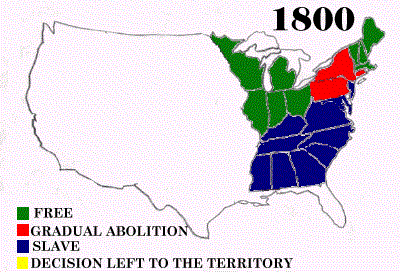|
The definition of slavery, taken from Concise Columbus Electronic Encyclopedia, states that slavery is "...the institution whereby one person owns another and can exact from that person labor or other services." Slavery was wrong, cruel, and should not have happened, but it was a product of evolution up to that time. By the 18th century, slavery existed in the 13 colonies. It was present to the Civil War. In 1863, Lincoln's Emancipation Proclamation declared an end to slavery in the rebellious South. Pennsylvania, made up of a population of mainly Quakers, believed strongly in NO slavery, as well as Rhode Island, but that rule was violated often by non-believing members. Massachusetts was the first colony of the 18th century to make "...perpetual bondage legal..." (States the Ref. Library Vol 5, 1990). By 1808 the population of slaves tripled. |
The New England colonies, the Mid-Atlantic states, and the Chesapeake Bay were not large slave states like others but did own slaves. The population in the bay never reached the large amount of slaves that existed in the South.
The Northern and Southern states during the Civil War had about 4 million slaves. The Columbia Electronic Encyclopedia, 1995, states "...the attempts to compromise on permitting slavery in the western territories and the Missouri Compromise, Compromise of 1850, Kansas-Nebraska Act. States Right, etc...."
Further through the years slavery began to decline. Between 1774 and 1804, the North states began to abolish slavery. Slavery started to be abolished because of Nat Turner, a rebel of 1831, who became a turning point in the history of black slaves. As a result of the "repatriation" movement, returning slaves back to their original homes, the slave population decreased. Slavery was abolished in the United States in 1808.
In 1865, the 13th amendment was passed which stated: "Neither slavery nor involuntary servitude expect as a punishment crime where of the party shall have been duly convicted, shall exist within the United States or any place subject to their jurisdiction... Congress shall have the power to enforce this article by approve legislation." (Government in America, 131).
Emancipation must have been an emotional experience for the slaves. We see this in the words of Harriet Tubman, who was known as the "Black Moses of Her Race." She was said to be as "strong as a man and brave as a lion." She made 90 journeys to the South and led over 300 slaves to freedom. She was the leading "conductor" of the Underground Railroad. Harriet Tubman escaped from her master and departed to New York. She described her first taste of liberty: "I was free and I couldn't believe it. There was such a glory all around and the sun was shining through the trees and on our hills. I was free!"
Kristen S.
Ashley E.
Nicole E.
Sarah M.
Sources:
"Slavery." Concise Columbia Electronic Encyclopedia: 1994 Columbia University Press.
"13th Amendment" Government in America: 1994 Houghton Mifflin Company.
"Growth and Distribution of the Black Population" Reference Library of Black America Vol.5:1994 Gale Research Inc.
|
Teachers:
Visit our sponsor
for Social Studies Materials |
George Cassutto's Cyberlearning World:
http://www.cyberlearning-world.com
[Lesson Plan of the Day] [Cassutto Memorial] [About the Author] [Search] [Civics Lesson Plans]

